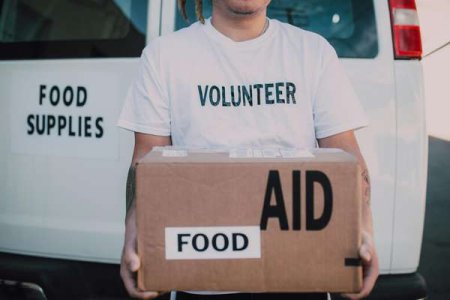Food pantries struggle to feed hungry Australians amid cost-of-living crisis
By
Danielle F.
- Replies 28
In a nation known for its wealth and resources, it's a sobering reality that hunger remains a pressing issue for many Australians.
The latest findings are in, and they paint a troubling picture: about two-thirds of food relief charities nationwide cannot meet the growing demand from those struggling to put food on the table.
OzHarvest, the nation's leading food rescue organisation, released its annual survey of 1,500 charities with alarming findings.
The survey underscored the severe impact of the cost-of-living crisis on the most vulnerable segments of our society.
Ronni Kahn, the founder of OzHarvest, expressed her dismay at the findings.
'We're delivering over half a million meals across the country every week, but it's just not enough,' she shared.
Charities are at their limit, with some turning away hungry individuals because of insufficient supplies.
Kahn revealed that most of these charities could double their food distribution efforts and still not satisfy the need.
The face of hunger in Australia is changing—more and more families with two working parents find themselves in a position where they seek assistance from food charities.
Marika, a mum from Western Australia, shared her reliance on OzHarvest's weekly deliveries to feed her children.
'With the cost of living, we're finding it very hard to have a constant supply of food in the house,' she said.
'With kids with an ever-growing appetite, it's a constant battle.'
The situation is equally dire in Brisbane—Jimmy from Community Friends West End reported that residents line up for two hours weekly to secure fresh fruit and vegetables.
'People are desperate to eat, be heard, survive, to get by another day,' he said.
The survey revealed that three-quarters of the charities have seen an increase in demand for food over the past year, with nearly one-third of those seeking help doing so for the first time.
The number of charities unable to meet demand has escalated to 67 per cent, compared to 47 per cent last year.
OzHarvest estimated that at least 30,000 Australians miss out on food monthly—an inaccurate figure as many citizens do not seek assistance.
Viele, a community worker in Melbourne, shared poignant observations of the hunger crisis.
'There are times when you look at someone's face and realise they haven't eaten in a couple of days,' she shared.
'The moment you heat a meal for them, their mood changes. They start asking questions.'
This situation raised critical questions about food security in Australia and the effectiveness of our social safety nets.
It's a call to action for communities, policymakers, and individuals to address the root causes of this crisis and support charities that are feeding the hungry.

Have you noticed the effects of the food crisis in your community? Have you or someone you know had to seek food assistance? Share your stories and thoughts in the comments below.
The latest findings are in, and they paint a troubling picture: about two-thirds of food relief charities nationwide cannot meet the growing demand from those struggling to put food on the table.
OzHarvest, the nation's leading food rescue organisation, released its annual survey of 1,500 charities with alarming findings.
The survey underscored the severe impact of the cost-of-living crisis on the most vulnerable segments of our society.
Ronni Kahn, the founder of OzHarvest, expressed her dismay at the findings.
'We're delivering over half a million meals across the country every week, but it's just not enough,' she shared.
Charities are at their limit, with some turning away hungry individuals because of insufficient supplies.
Kahn revealed that most of these charities could double their food distribution efforts and still not satisfy the need.
The face of hunger in Australia is changing—more and more families with two working parents find themselves in a position where they seek assistance from food charities.
Marika, a mum from Western Australia, shared her reliance on OzHarvest's weekly deliveries to feed her children.
'With the cost of living, we're finding it very hard to have a constant supply of food in the house,' she said.
'With kids with an ever-growing appetite, it's a constant battle.'
The situation is equally dire in Brisbane—Jimmy from Community Friends West End reported that residents line up for two hours weekly to secure fresh fruit and vegetables.
'People are desperate to eat, be heard, survive, to get by another day,' he said.
The survey revealed that three-quarters of the charities have seen an increase in demand for food over the past year, with nearly one-third of those seeking help doing so for the first time.
The number of charities unable to meet demand has escalated to 67 per cent, compared to 47 per cent last year.
OzHarvest estimated that at least 30,000 Australians miss out on food monthly—an inaccurate figure as many citizens do not seek assistance.
Viele, a community worker in Melbourne, shared poignant observations of the hunger crisis.
'There are times when you look at someone's face and realise they haven't eaten in a couple of days,' she shared.
'The moment you heat a meal for them, their mood changes. They start asking questions.'
This situation raised critical questions about food security in Australia and the effectiveness of our social safety nets.
It's a call to action for communities, policymakers, and individuals to address the root causes of this crisis and support charities that are feeding the hungry.
Key Takeaways
- Australians are facing record levels of need for food relief, with two-thirds of charities unable to meet the growing demand.
- OzHarvest's annual survey exposed the critical situation in which families with multiple incomes now turn to food charities.
- The cost-of-living crisis has impacted the most vulnerable, leading to long queues and children being kept home from school due to lack of food.
- The situation worsened over the past year, as 67 per cent of charities reported they cannot fulfil the demand for their services.








